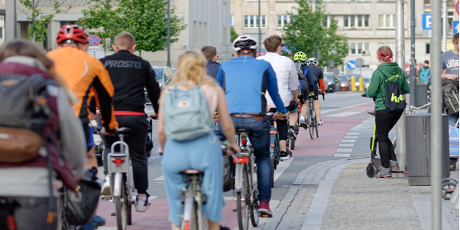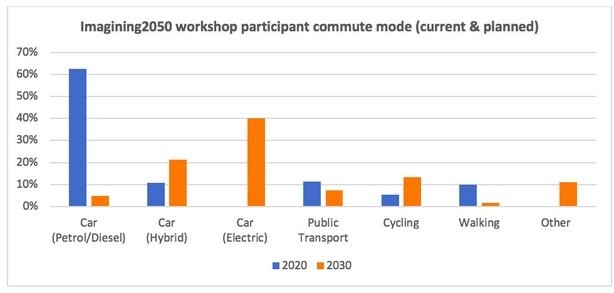Why we need a technological dialogue around climate change 16 Oct 2020

Originally published on RTE Brainstorm
Opinion: how people will use new and existing technologies must be considered to avoid unintended negative consequences
By Fionn Rogan and Alexandra Revez, UCC
Dr Fionn Rogan is a research fellow in the Energy Policy and Modelling Group at MaREI and the ERI. Dr Alexandra Revez is a Senior Postdoctoral Researcher with Imagining 2050 at the Cleaner Production Promotion Unit at the School of Engineering and the ERI.
Before Covid-19, how did you commute to work? How will you commute in 10 years? What is the energy efficiency of your home now? What will it be in 10 years? How do you choose your electricity supplier: price, environmental credentials or pure inertia?
The answers to these questions will substantially influence whether or not Ireland transitions towards a low carbon society. The answers will contribute to whether Ireland’s climate and energy emissions continue to increase, stay the same, or decrease rapidly. But how often are the answers to such questions used in an assessment of Ireland’s future climate and energy emissions?
From RTÉ Radio 1's Morning Ireland, how National Bike Week is encouraging more people to cycle to work and school
Studies of Ireland’s future climate and energy emissions frequently focus on technology diffusion and the impact of economic incentives - and I say this as someone who has co-authored many such studies. These analyses use technology costs, estimates of fuel prices, resource availability, and the impact of policy interventions. Crucially, they make assumptions about people and their behaviour. But instead of assuming, why don’t we ask?
Over the past two years researchers from UCC and Queen’s University Belfast have been collaborating on an EPA-funded project called Imagining2050, that has been engaging with groups of citizens in different parts of Ireland. In a number of workshops, we have explored different methods (such as community mapping, empathy mapping, audience polls, storyboarding) for engaging with citizens to understand their future plans and aspirations and how their preferences might influence Ireland’s energy and climate future. We began by asking workshop participants how they currently commute and how they plan to commute in 10 years (ie, in 2030).

In their current mode of commuting, our participants were generally very similar to the national average with a high share of private car, a low share of public transport and a low share of active modes (walking and cycling). For future commuting, a majority intended to continue driving, but to switch from petrol/diesel to either hybrid or fully electric vehicles.
At first glance, the participant's preferences were for low carbon options. Such a large-scale switch to electric vehicles coupled with a decarbonised electricity system would reduce emissions. When we projected the impact of these results using a simple energy and emissions model, we saw a dramatic reduction in emissions. But was this sustainable?
When we discussed some of the implications of the future commuting mode choice, a more complex picture emerged. Despite the decarbonisation benefits of a switch to hybrid or electric vehicles, there was an overall increase in driving and a decrease in walking in a majority of our workshops. The potential consequences of this were worse traffic congestion and negative health outcomes (from prolonged sitting and less exercise).
From RTÉ Archives, a 1999 episode of Questions & Answers presented by Vincent Browne asks of bus corridors add to traffic congestion
As we continued to tease out the implications, the link between commuting options and settlement patterns became apparent. Car dependency (electric or otherwise) will worsen unless appropriate sustainable city and county development plans are put in place and implemented. The potential for long commutes to undermine community bonds and social cohesion was also mentioned, together with associated negative consequences for personal well-being. These discussions cast a new light on the initially less favoured mobility options of public transport and active modes. It also paved the way for discussion of more behaviour-based options such as shared mobility, car-pooling and remote working.
For home energy efficiency and electricity supplier choice, we had similar discussions. In each case, a dialogue occurred that went beyond narrow definitions of technology switching. As we deliberated over the implications of energy choices, we engaged in an expansive discussion on sustainability. Ireland has very ambitious 2030 climate targets in the areas of personal mobility (840,000 electric vehicles) and home energy efficiency (500,000 retrofits) so it is essential to understand the experience of people in these areas. How technologies are used and embedded in people’s lives must be considered to avoid unintended negative consequences.
From RTÉ Brainstorm, are car-free cities the way to cut through the gridlock?
In 2017, Ireland’s Citizen Assembly concluded with very high levels of support for climate action that would "make Ireland a leader in tackling climate change". Despite subsequent climate policy interventions and the emissions reductions wrought by Covid-19, Ireland has some distance to go before being a leader on climate mitigation (we are not even yet compliant for our 2020 non-ETS targets). However, the success and model of the Citizen’s Assembly on climate action has gained international attention and could mark Ireland as a leader for deliberative processes.
There is ample scope for forums to engage in a technological dialogue that can tease out many of the challenging issues about the wicked problem of climate change. These forums don’t have to be as extensive or as large scale as a citizen’s assembly. For example, the recent growth in the number of energy communities in Ireland is a positive development that could be harnessed to support and host such deliberative discussions. One of the outputs of the Imagining2050 project will be a toolkit of activities that can be used by any community group to explore their aspirations for a sustainable future. This will enable the transition to a zero-carbon society to involve all parts and members of society.